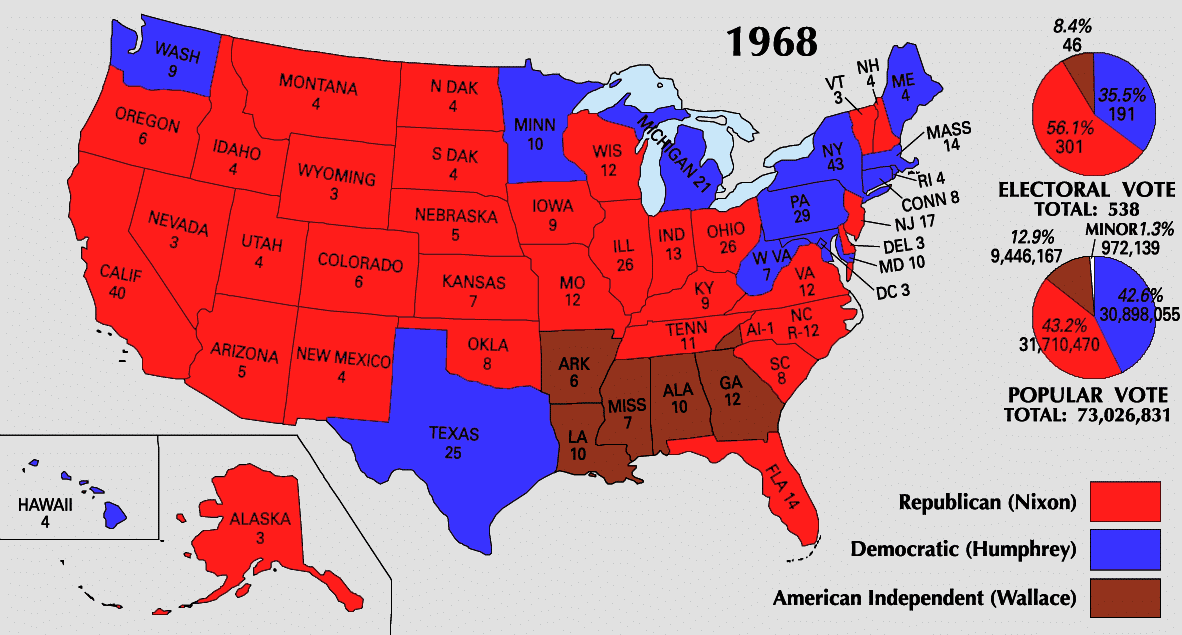The Presidential Election of 1968 was full of drama, tragedy, and controversy.

The Incumbent President Lyndon Johnson had won a convincing victory in the election of 1964, but much like Harry Truman, his foreign policy buried him. The Vietnam War had become a lightning rod for controversy, and America was in the throes of change.
Social change had begun to sweep America as the sexual revolution, birth control, abortion, civil rights, and anti-war protests highlighted the news. The children of the World War 2 generation, or the baby boomers, had grown up in a different world than their parents and, therefore, saw the world in a different way.
Lyndon Johnson withdrew from the election, and front-runner Robert Kennedy was assassinated shortly after. With two of the main faces of the Democratic party out of the race, the party was forced to try and find a different candidate.
It had been over a decade since Brown vs Board of Education had changed the landscape of segregation, but the battle was not over. States still discriminated, and many African Americans were at risk. During the election of 1968, there was a party that ran on a segregation ticket and won electoral votes.
The candidates were as follows:
- Republicans: Richard Nixon and Vice President Spiro Agnew
- Democrats: Hubert Humphrey and Vice President Edmund Muskie
- American Independent: George Wallace and Vice President Curtis LeMay
Platforms
Republicans: Richard Nixon was a skilled politician and positioned himself as a candidate for all people. He campaigned to restore "law and order," which appealed to many of the voters who did not like the rioting and the Martin Luther King Jr. assassination. He also spoke out against the draft, which would help undermine the anti-war movement in the country. Lastly, he promised to nominate conservative judges who would not be political activists like the Earl Warren court had become.
Democrats: Hubert Humphrey campaigned on Lyndon Johnson's policies, saying that he wanted to continue the "war on poverty" and continue to create welfare programs to assist the poor. He also promised to continue the efforts of Presidents Kennedy and Johnson and the Supreme Court in promoting the expansion of civil rights and civil liberties for minority groups. However, he would not speak out against the Vietnam War.
American Independent: The American Independent candidate, George Wallace, had little chance of winning but did manage to win electoral votes. He ran on a segregation ticket and wanted to go back to the earlier policies of Plessy v. Ferguson.
Outcome
Richard Nixon took an early lead in the polls, but his lead would evaporate during the month of October when peace talks in Vietnam began, and Humphrey received a bump in the polls.
However, in a last-ditch effort to save his election, Nixon set out to sabotage the peace talks. President Johnson learned of what was going on and said that "Nixon had blood on his hands."
There were a lot of backdoor deals being done.
President Johnson had wiretaps and proof of what Nixon was doing. He spoke with Humphrey, and Humphrey believed he was now going to win the presidency and did not release the recordings.
That decision would prove to end his election chances as Nixon would go on to carry California, Ohio, and Illinois and win the electoral college.
Had Humphreys carried those states, he would have won, and if he had split the states, the election would have been sent to the house that was controlled by the Democrats.
It would be a decision that Hubert Humphreys would regret for the rest of his life.
